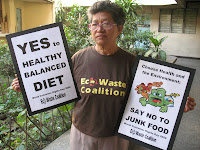Protect Our Children from Junk Food and Bad Health
 Quezon City. Healthy and balanced diets for hale and hearty children and a waste-free environment.
Quezon City. Healthy and balanced diets for hale and hearty children and a waste-free environment.This is the call of the EcoWaste Coalition as it joins Consumers International in celebrating the World Consumers Rights Day (WCRD) on March 15 to seek global and local action to stop the marketing of unhealthy food to children.
“Junk food contributes to the childhood obesity epidemic and other preventable diseases, and also adds to the garbage crisis with the tons of trash created by the production and consumption of these unhealthy food that are often packed or served in single-use plastic materials,” Ofelia Panganiban of the EcoWaste Coalition said.
Panganiban, a barangay nutrition scholar and grandmother of 19 children, actively promotes inexpensive, locally-sourced, tasty and healthful alternatives to junk food, including food containing malunggay, the “miracle” vegetable, which is known for its nutritional and medicinal properties.
Among her favorite substitutes to energy-dense and micronutrient-poor snacks include pan de sal with powdered malunggay, burger patty made of saba peelings or grated coconut leftover, crackers and chips from camote or squash, fresh fruits, and steamed or boiled banana, camote and corn.
In place of sugar-filled soft drinks, Panganiban recommends nutritious thirst quenchers like the “pink lady” (camote tops with calamansi), “white lady” (kamias or ginger lily with calamansi), “avo-pan” (avocado leaves with pandan), salabat or ginger tea and other creative concoctions from tamarind, star apple, dalandan and other tropical fruits.
Citing the 2006 World Health Organization (WHO) report “Marketing of Food and Non-Alcoholic Beverages to Children,” the eco-group stressed that children’s exposure to commercial advertisements promoting food and drinks high in fat, salt or sugar has a direct influence on children wanting and eating junk food. Experts believe that such food promotion has a deleterious effect on children’s food knowledge, attitudes, purchase behavior and consumption.
“Given the Filipino children’s over-exposure to TV ads that tend to promote unhealthy eating choices and habits and their vulnerability to such marketing pressure, we see the urgent need for concerted actions that will protect our young consumers from childhood obesity,” the EcoWaste Coalition stated.
The eco-group cited the effort of Ireland which has recently imposed a ban on TV advertisements for candy and fast food, and has stopped celebrity endorsements of unhealthy food to children. The Irish government now requires wrappers to carry warnings like, "Fast food should be eaten in moderation as part of a balanced diet," or, "Snacking on sugary food and drinks can damage teeth."
The WHO, the EcoWaste Coalition noted, has committed itself in the 2007 World Health Assembly to “promote responsible marketing including the development of a set of recommendations on marketing of foods and non-alcoholic beverages to children”.
According to Consumers International, unhealthy diets are a major cause of diabetes, heart disease and some cancers in low and middle-income countries, warning that some 22 million children under the age of five around the world are already overweight or obese.
For additional information, please log on to:
1. World Consumer Rights Day 2008:
www.consumersinternational.org
2. WHO report on the marketing of food and non-alcoholic beverages to
children:
http://www.who.int/dietphysica
EcoWaste Coalition
Unit 320, Eagle Court Condominium, Matalino St.
Quezon City, Philippines
+63 2 9290376
ecowastecoalition@yahoo.com





Comments